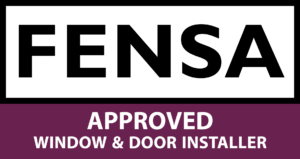What do I need to know when buying windows?
To help you out, we look at the key qualities that a well-made window should have and provide you with the questions that you should be asking your supplier.
Enlightened Windows sell some of the highest quality wooden windows on both supply-only or supply-and-fit basis.
- Table of Contents:
- 1. Timber Density
- 2. Paint Type and Thickness
- 3. Are the seals used made from butyl rubber?
- 4. Is the timber used to make the windows completely knot-free?
- 5. The hinges used on the window
- 6. Does the window use a multipoint espagnolette to lock the window, and how does this pull in tight?
- 7. How many pages is the guarantee document for the product?
- 8. What is the country of manufacture?
- 9. Is it Well-Marketed or Well-Made?
1. Timber Density
This is the single most important thing to look for; our Danish made windows have a timber density of at least of 450 kg per cubic metre of timber, and this is regularly inspected by the DVV.
Compare this to the average window made in the UK, which has less than 200 kg/m3.
This is really important if the paint surface on the timber does get damaged, or is not maintained properly. A sturdy timber beneath will not have the same tendency to absorb water, which is the cause of windows starting to rot.
It makes no difference whatsoever if the timber is treated, as the centre of the timber cannot be treated via those processes. Surface treatments only surface deep; wood can still rot from the inside…
We often still see old Victorian Windows still going strong in terms of solidity and without signs of rot showing – this is simply because they used a high density timber.
Many people think that by ordering hardwood windows is an easy route to obtaining a window that will last a long time, but so many so-called “hardwood” options are fast-grown plantation species and simply do not have the required density.
Our Danish Windows use northern hemisphere European-grown timber. This is knot-free and has a minimum density of 450 kg per cubic metre.
Mostly, this will be made from Nordic pine, as is an excellent material for combining insulative properties with durability. Hardwood windows can’t achieve the same insulation values as easily; another reason to avoid.
One of our most innovative Danish factories are embarking on a 3-layer laminated timber idea: where the outer two layers are a hardwood beech for the initial durability, and the inner layer is pine for improved insulation.
Unsurprisingly, the timber used in a timber window is clearly important: ask what timber density and species you’re being offered.
Further reading: Assessing Quality in Wooden Windows
Further reading: Danish Window Manufacturing Quality; The Timber It’self
2. Paint Type and Thickness
Bearing in mind that a typical industry requirement is around 70-80 microns, our Danish wooden windows far exceed that with a paint thickness varying between 100-220 microns.
Since the paints used in the production of our windows contain no polymer and no oil, they do not experience the same UV degradation so commonly founds in the UK industry.
Of course, the paint layers link back to protecting a tibmer window from rotting within, so all our applications are a water-based microporous solution. This allows any trapped moisture to escape if needed. This is actually something you can easily see as a problem with oil-based paints: these seal the timber completely, trapping any moisture content. When that moisture trys to escape, you’ll see blistering and cracking paintwork, which prompts people to re-apply the same paint to “fix” the problem, which creates further issues…
Ask what paint thickness is used, and make sure the product is water-based.
3. Are the seals used made from butyl rubber?
All of our Danish Windows use butyl seals. In engineering terms, if you want something to last 100 years, this product will not shrink and will retain its elasticity.
Compare this to the oil-based seals used in the UK: these can shrink back as the oil within the seal wears off; giving you a product with a reduced lifespan.
The seals on our Danish and German windows are continuous around the corners of the opening casements. You’ll often see products where seals meet at each corner – not too bad when they are new, but useless after shrinking back over time.
Ask what material is used to make seals, and how long are they expected to last… Just “rubber” doesn’t tell you enough.
Further reading: Airtightness and conserving energy
4. Is the timber used to make the windows completely knot-free?
Timber knots are common place on most UK made windows in fact some manufacturers even from Europe allow up to 25 mm knots
This can lead to bleed through on the internal and external paint finish and not often shrink overtime leading to a point of weakness and Fissure on the Paint surface this allowing unsightly stains or, worse still, cracks in the paintwork to allow water to penetrate
The most interesting way of seeing this is on a clear lacquered window, where you can see the bare timber. On ours, you can clearly see the way the timber has been engineered, where every section of every length has been carefully selected and fingerjointed together to be certain the final product won’t have any imperfections or have knots bleeding through paintwork.
Ask if the timber used to make the window is completely knot free.
Further reading: Assessing Quality in Wooden Windows
5. The hinges used on the window
Most UK-made casement windows use scissor hinges which are steel hinges like the pictures below.
On the corner of each hinge, they have a plastic pull-in block to guide the edge of an opening casement into line as you close it. This is an incredibly frequent failure point regardless of the product its fitted to because the casement failing to catch onto the correct side of the block just once means the hinge will bend out of shape as you close it.
We mainly use side hung windows with barrel hinges externally and the majority of these are made by Assa Abloy in Sweden from very high-quality materials with low propensity to wear
Ask if the windows use scissor hinges with pull-in blocks at the hinge side. We suggest this kind of hinge is avoided at all costs.
6. Does the window use a multipoint espagnolette to lock the window, and how does this pull in tight?
This is a major failing of most UK-made windows as they have a single point lock with a corresponding latch on the inside of the window to try pull the whole window tight into the frame all by itself.
The Danish knew this would work decades ago, and their traditional casement fastener option continues to be hugely popular in Scandinavia today – still complying with modern airtight regulations.
This level of consistent sealing on a casement is really important when extreme weather of the winter comes along.
If you look at the pictures shown, you can see how multiple different locking points both hinge side and leading edge side, for larger windows, mean that our windows achieve the best possible rating of Class 4 airtightness.
Ask:
Do your windows use espagnolette lock?
How does the window sash pull into the frame tightly? Asked to be shown if there are any metal-on-plastic joints – these can create issues all by themselves.
Are any plastic moving components used in the manufacture?
What is the airtightness class of the product? A lot of window companies will just look at you blankly as they don’t even know what this is.
7. How many pages is the guarantee document for the product?
We have seen windows made in the UK with up to 62 pages of terms and conditions… Ultimately: 62 pages of reasons why a company won’t pay out for a warranty claim.
Some of our warranties are written on a single page: straightforward. Mostly, they indicate that if you look after the windows properly, they will be properly warranted in a no-nonsense format.
Ask to read the guarantee terms and conditions before buying.
8. What is the country of manufacture?
This is still an important area to ask about, because different countries build windows with very different philosophies, regulations and requirements.
As an easy example: we’ve come across some Italian factories who look to be offering some genuinely brilliant high quality products…but installing a window designed for an Italian climate in the UK isn’t a great idea at all.
You’ll also discover there are a few companies with German, or Scandinavian-sounding names for marketing purposes, but with factories located in the far east.
Products made physically in German factories and Danish factories are government-regulated and the quality of the product is consistently of a very high standard. Combine that with most of Denmark and Germant catering for a very similar and varied climate to our own, this is a stunning combination and the main reason why we’re very happy offering a carefully-selected few manufacturers from these areas.
9. Is it Well-Marketed or Well-Made?
Many products these days have lots of money spent on marketing, and little money spent on manufacturing the product itself. Lots of advertising. Glossy magazine adverts. Presence at exhibitions. These should all be early warning signs of a brand that is prioritising marketing over product development and improvement. Most prospective customers finding this website will have scoured the internet to find quality windows and found very few contenders to get quotations from.
There are very few companies selling German or Danish-made windows in the UK, and with good reason. The differences between countries’ building regulations, building practises and windows themselves mean that a product must be selected carefully before bringing it to the UK market.
This is where Enlightened Windows has found its niche. Our staff thoroughly understand both modern methods of construction and methods long lost. We pride ourselves on helping you to carefully select the best product for your home. We prudently pick products from the whole of the German and Scandinavian window market to bring the best and most suitable products to our shores.
Contact us!
For any questions about our products and services, or to get your quote,
please get in touch by phone, email, or using our in-browser contact form!
Leamington: 01926 935 607
London: 0203 633 0476
E-mail : sales@enlightenedwindows.co.uk
Contact Form: Contact Us














